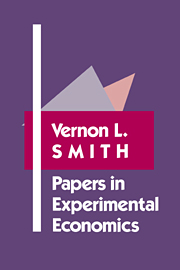35 - Theory, Experiment and Economics
Published online by Cambridge University Press: 06 July 2010
Summary
It is now over thirty years since research was initiated in the laboratory experimental study of market behavior and performance. This essay provides my interpretation of what the implications of this type of work are for the study of economics. The essay is not intended as a systematic survey of the field, although examples will be cited where appropriate and necessary. The reader can find the associated references in more general surveys (E. Hoffman and M. Spitzer, 1985; C. Plott, 1979, 1982, 1986a, 1986b; V. Smith, 1976, 1980, 1982a, 1982b, 1986).
Experimentation and Economics
Economics as currently learned and taught in graduate school and practiced afterward is more theory-intensive and less observation-intensive than perhaps any other science. I think the statement that “no mere fact ever was a match in economics for a consistent theory” accurately describes the prevailing attitude in the profession (Milgrom and Roberts, 1987, p. 185). This is because the training of economists conditions us to think of economics as an a priori science, and not as an observational science in which the interplay between theory and observation is paramount. Consequently, we come to believe that economic problems can be understood fully just by thinking about them. After the thinking has produced sufficient technical rigor, internal coherence and interpersonal agreement, economists can then apply the results to the world of data.
- Type
- Chapter
- Information
- Papers in Experimental Economics , pp. 783 - 801Publisher: Cambridge University PressPrint publication year: 1991
- 3
- Cited by



